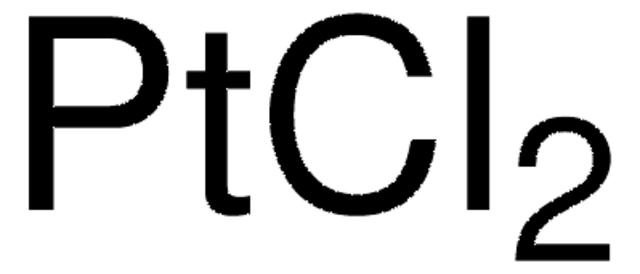206105
Ammonium tetrachloroplatinate(II)
99%
Synonym(s):
Platinum(II)-ammonium chloride
About This Item
Recommended Products
Quality Level
assay
99%
form
solid
mp
140 °C (dec.) (lit.)
density
2.936 g/mL at 25 °C (lit.)
SMILES string
[H][N+]([H])([H])[H].[H][N+]([H])([H])[H].Cl[Pt--](Cl)(Cl)Cl
InChI
1S/4ClH.2H3N.Pt/h4*1H;2*1H3;/q;;;;;;+2/p-2
InChI key
QJIMNDWDOXTTBR-UHFFFAOYSA-L
Looking for similar products? Visit Product Comparison Guide
Application
- Deactivation study of the hydrodeoxygenation of p-methylguaiacol: Studies catalysts prepared using ammonium tetrachloroplatinate(II), focusing on sustainable chemical processes relevant across academic research (Bouxin et al., 2017).
Features and Benefits
signalword
Danger
hcodes
Hazard Classifications
Acute Tox. 3 Oral - Eye Dam. 1 - Resp. Sens. 1 - Skin Irrit. 2 - Skin Sens. 1
Storage Class
6.1C - Combustible acute toxic Cat.3 / toxic compounds or compounds which causing chronic effects
wgk_germany
WGK 1
flash_point_f
Not applicable
flash_point_c
Not applicable
ppe
Eyeshields, Faceshields, Gloves, type P2 (EN 143) respirator cartridges
Choose from one of the most recent versions:
Already Own This Product?
Find documentation for the products that you have recently purchased in the Document Library.
Customers Also Viewed
Our team of scientists has experience in all areas of research including Life Science, Material Science, Chemical Synthesis, Chromatography, Analytical and many others.
Contact Technical Service












